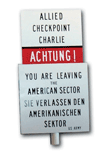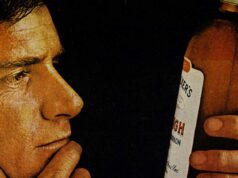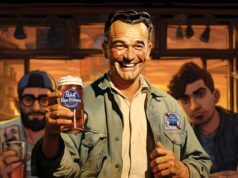 Try to imagine a bar frequented only by star-crossed lovers. A watering hole inhabited by couples doomed never to share each other’s lives — only a few stolen moments over cocktails. It sounds like a place that could only exist in The Twilight Zone or the imagination of William Shakespeare, right? Wrong. I’ve been there, even bought a round for the house; but to tell my story I must first describe an era in which the Cold War was still very chilly indeed…
Try to imagine a bar frequented only by star-crossed lovers. A watering hole inhabited by couples doomed never to share each other’s lives — only a few stolen moments over cocktails. It sounds like a place that could only exist in The Twilight Zone or the imagination of William Shakespeare, right? Wrong. I’ve been there, even bought a round for the house; but to tell my story I must first describe an era in which the Cold War was still very chilly indeed…
Berlin, East Germany, 1978—My first impression of Checkpoint Charlie was that the East Germans hadn’t evolved much since the Nazis were running the show. The uniforms and attitudes seemed the same, the only difference was these guys were commies.
I was hoping to spend a few days in East Berlin, but these militaristic hard-asses clearly didn’t want me there. They tore apart my luggage and tossed out a Blondie 12-inch record I’d brought as a gift for a friend. The commandant stared me down.
“Is there any reason you are bringing this sort of cultural material into East Germany?” he demanded.
I laughed. “It’s not culture,” I told him, “it’s just pop music.”
He slammed his fist down, snatching the record at the same time.
“We’ll see exactly what it is. Sit down and wait.”
I sat down, terrified that my destiny seemed to be resting upon whatever counter-revolutionary significance a Blondie record might possess. An hour elapsed, and then another. At length, the hard-ass reappeared with an entire posse in tow. His demeanor was brighter and friendlier. Grinning, he handed me back the record and asked, “Are you a friend of Blondie?”
I’ve seen them in concert, I told the man, but I don’t really know any of them as such. No, no, no, he protests, he has heard them often on the Radio Free Europe, he is a “large friend” of the group, as are his fellow inspectors. His pals grin broadly.
For the first time I realize that these fellows have the number-one sweetheart gig in communist Germany. They’d kept me waiting because they’d been listening to the 12 inch over and over again. These seemingly spit-and-polished storm troopers who I had initially feared might be my firing squad, appeared even more corrupted by Western decadence than those they guarded from it. They certainly had better access to it.
I was duly informed that I was free to proceed as soon as I purchased a visa and exchanged a sizable amount of American dollars for East German Deutschmarks. Needless to say, the exchange rate was utterly insane. The East German mark was all but worthless.
Das Commandant, who by this point imagined me some sort of kindred spirit, stepped outside and confided in me. There was no human way, he informed me, that I would be able to spend all that money in three days. He gestured toward a building a half block away. That’s a bar down there, he told me. And not just any bar, it’ was a kind of nexus between the East and West. It was a place where lovers drank before one or the other went back to the West through Checkpoint Charlie. Go there early in the day, he advised me, and attempt to drink up all your cash. If you can’t, buy a round for the house. Seriously.
Of course, the bar was my first stop. After Checkpoint Charlie you need a drink.
If the place had a name, it didn’t gleefully advertise it the way Western bars do. I admit it didn’t make a large impression, this first visit. I didn’t drink up all my marks—though I made a fair start—and was soon in an excellent condition to explore East Berlin.
I quickly discovered the area around the checkpoint was a devastated no-man’s land. Block after block of oblivion punctuated by towers peopled with snipers making sure no one tried to circumvent Checkpoint Charlie.
Amidst this landscape that had undoubtedly changed little since WWII, I came upon a phone booth. It squatted in the rubble and desolation like an artist’s rather broad attempt at surrealism.
I inserted coins into the phone and it sounded as though they were tumbling down a massive echo chamber into the underworld itself. My local friend gave me instructions on how to navigate to Potsdamer Platz and which train to catch. En route I noticed a massive cement structure thrusting forth from the gravel and a semi-collapsed tower.
Intrigued, I ventured down a stairwell, entering a small dank room filled with pools of musty water, broken bottles and the unmistakable debris of teenage parties. The stairway continued downwards and I wondered what lay down in that darkness, but sans matches or a lighter, it was a mystery I had to pass on. Decades later I discovered that this place was the Führerbunker, the place where Adolph Hitler and his cronies spent their last weeks on earth. That’s how bad the kids in East Berlin had it—they had to party in the anteroom of Hell.
Potsdamer Platz was like a Salvador Dalí painting. Dominated by a massive statue of a gesticulating German casting its shadow across the square, it should have been choked by congested traffic. But it wasn’t. It was empty, no cars and no people. An eerie silence hung in the air. Like those episodes of The Twilight Zone in which a man wakes up to find that he’s the last person on earth. Being somewhat drunk only made it better.
The subway station presented the same scenario. It was a vast complex of endless marble-slab hallways, each stretching out to a vanishing point. There were no ticket takers or sales people, just a pole bearing hundreds of train tickets and a plastic box in which to insert your fare before taking a ticket. I could easily have grabbed a ticket and not paid, but this was a police state and I didn’t want to tempt fate.
When the train arrived at the platform I was pleasantly surprised to see other human beings aboard. As the vehicle emerged from underground and onto an elevated track, I was struck by the fact that there was no color, only shades of grey. The sky was grey, the buildings were grey, the streets were grey. Rusted signage from the pre-Wall era was the only proof the city was once part of the 20th Century.These few remnants from the 50s looked downright futuristic in 1978 East Berlin. The place was perhaps fascinating on one level, but mostly depressing.
I got off the train to find my artist friend waiting for me. I demanded we go to the nearest bar, just to drink away the grey, but was told it was better to drink at his house. We walked through a terrain so bleak and soul-destroying that the posters and billboards of burly revolutionary workers brandishing tools and firearms only seemed to accentuate the vast abyss between daily life and the long-decayed communist ideal. Nevertheless, I must confess to a certain excitement at being in the midst of a totalitarian regime. Yes, it was total bullshit, but the constant reminders that the populace were revolutionaries involved in a magnificent struggle was, uh, almost cool.
I paused to take a picture of a billboard in which a Caucasian, a black man and an Asian are embracing and — presumably — advancing toward a glorious future.
“Does anyone here really buy into this stuff?” I asked my host.
“No,” he said. “Not for many decades, I think.”
The next few days were a bleak whirlwind, a protracted nightmare softened only by the large amount of alcohol I used to paint the world around me. My gracious East German hosts attempted to offer me the best their world, but I encountered situations that would make the most hardened Fear Factor contestant gag. Finally, in an attempt to perhaps salvage their national gastronic reputation, my host took me to East Berlin’s finest restaurant where I was served the finest dish on the menu. Confused at the sight of it, I asked what it was I was fearfully gnawing on. It took a while, but at long last they divined the proper English words for it: bird hearts. Fabulous. I required no less than a bottle of industrial-strength wine to wash it down.
When I finally made it back to the bar near Checkpoint Charlie, I was more than ready for it. My host gazed into the depths of his beer and told me tales of a girl from the West he’d been in love with. They’d drink together at that very table, and when the bell for last call rang, she would return to her world. After a while she never came back. A friend of his met his own Western girl at the bar and longed for her so much that he attempted to go over the wall. He was machine-gunned to death.
It began to dawn on me that this was perhaps the most Wagnerian watering hole in Europe, if not the world. It was then that I remember the advice of the border guard. That I should “buy a round for the house. Seriously.”
Just as the guard had foretold, I still had plenty of East German marks left; largely because there was nothing to buy in East Berlin. So I took out my wad of bills and asked the bartender if there was enough to buy everyone a beer and a shot. Indeed there was, and then some. He began filling beer mugs as his partner poured schnapps into shot glasses. For a brief while, the gloom dissipated as the smiling patrons bellied up to the bar for free drinks.
I filled the ancient jukebox with my remaining coins. The selection was mostly German folk songs, a few Heino singles, and a 45 by an early-‘60s Polish girl group called Filipinki. Certain of the folk songs hit a real nerve with the customers, who began singing along the moment the songs began. It was as though I’d stepped into a scene from Cabaret, and the effect was both stunning and eerily disconcerting.
As the night wore on and the consumption of alcohol increased, so too did the sense of melodrama. Lovers held one another’s hands and gazed into each others eyes in absolute silence. Others wept. Some couples were very young, others perhaps in their late fifties. The atmosphere in the bar was such that many a lone tourist stopping in for a drink on the way back to the West would take one step inside, scan the scene and turn on their heels. The place was literally suffused with a palpable sense of tragedy. And as the hour grew later the vibe intensified. I had no desire to hang around and see what last call might bring, so my host and I exited into the night.
As we said our farewells into the cold night air, my friend said I could stay at his house anytime I visited East Berlin. I said I would, but after shaking his hand and walking away down the wet cobblestone road, I knew I’d never go there again.
Exiting Checkpoint Charlie, I was waved through by the American guards. I stepped over a line painted on the pavement and passed into a different reality. Suddenly there was color everywhere. Neon lights flashed and garish ads screamed for attention. Vast columns of cars zoomed past with their radios blaring and I caught snippets of the latest ABBA song. The West is certainly more to my liking, but I couldn’t resist romanticizing ever so slightly the sense of melancholia I’d experienced in the East; the doomed lovers who perhaps even at that moment were sharing a final last-call cocktail before parting and returning to their separate worlds.
In a better world, that Checkpoint Charlie bar would be preserved as a great monument to Melancholy. A place where two worlds as different night and day came together. A place where East and West reached out for each other over a drink.
I often wonder whether it still exists, or if the star-crossed lovers from the Cold War era return there to transverse memory lane. I’d like to imagine so.










